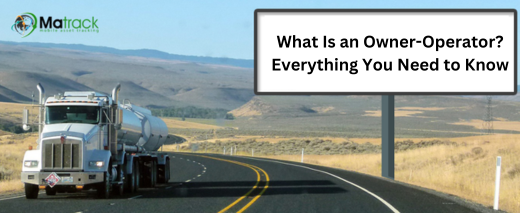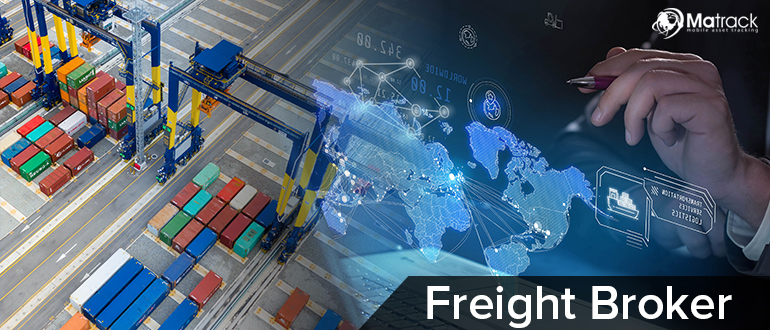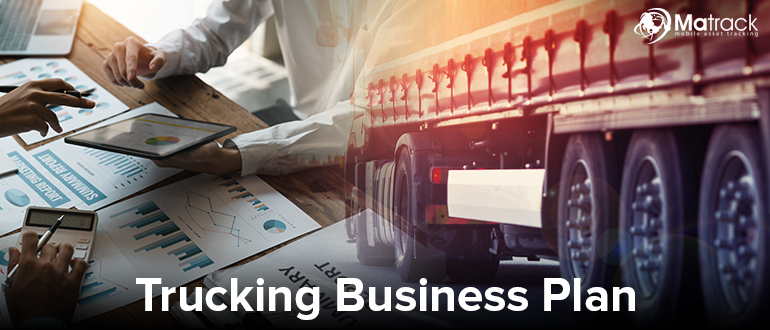Key Takeaways
- Owner-operators run their own trucking business, either leasing to a carrier or operating independently.
- They manage everything from securing loads and maintaining their truck to handling finances and compliance.
- While startup and operating costs are high, earnings can range from $50,000 to $120,000 after expenses.
- Success depends on smart financial management, industry connections, and using tools like GPS tracking and ELDs to streamline operations.
What Does Owner Operator Mean?
An owner-operator is an individual who owns and operates a trucking business. They either lease their services to a motor carrier or operate under their own authority to haul freight. This means they are responsible for securing contracts, managing expenses, maintaining their equipment, and complying with federal and state regulations.
Owner-operators can be found in various industries, including:
- Trucking and logistics (long-haul, local delivery, specialty freight)
- Construction (heavy equipment hauling)
- Towing and recovery services
- Agriculture (livestock and grain transportation)
Types of Owner-Operators
Owner-operators generally fall into two main categories:
Leased Owner-Operator
A leased owner-operator contracts their services to an established carrier. In this setup, they haul freight under the carrier’s authority and typically use the carrier’s permits, insurance, and fuel cards.
Advantages:
- Steady freight supply
- Lower administrative burdens
- Support with insurance and compliance
Disadvantages:
- Limited control over freight choices
- Less negotiating power on rates
- May pay fees to the leasing company
Independent Owner-Operator
An independent owner-operator runs their business under their own authority, meaning they find and negotiate freight contracts themselves.
Advantages:
- Full control over load selection
- Higher potential profits
- Ability to build a trucking brand
Disadvantages:
- Requires extensive paperwork and compliance management
- Higher upfront and operational costs
- Responsible for securing loads and contracts
Key Responsibilities of an Owner-Operator
Owning a trucking business comes with various responsibilities beyond driving a truck. Some of the critical tasks include:
Business Operations
- Choosing whether to lease onto a carrier or run independently
- Managing business finances, including budgeting, taxes, and profit margins
- Handling insurance policies (liability, cargo, and health)
- Maintaining proper licenses and registrations
Equipment Maintenance
- Regular truck servicing and repairs
- Keeping up with Department of Transportation (DOT) inspections
- Managing fuel efficiency and compliance with emission standards
Finding and Managing Loads
- Negotiating rates with shippers or brokers
- Using load boards or direct contracts to secure freight
- Scheduling deliveries to maximize efficiency
Know more about finding truck loads for Owner Operators.
Compliance and Regulations
- Maintaining Commercial Driver’s License (CDL)
- Following Federal Motor Carrier Safety Administration (FMCSA) guidelines
- Keeping accurate records of hours of service (HOS)
- Complying with International Fuel Tax Agreement (IFTA) and other state/federal tax regulations
Also see: What Is FMCSR?
How to Become an Owner-Operator
Becoming an owner-operator involves several steps, from obtaining a CDL to registering a trucking business.
Get Your CDL
A Commercial Driver’s License (CDL) is required to operate heavy trucks. The process includes:
- Passing a written knowledge test
- Completing behind-the-wheel training
- Passing a CDL road test
Gain Driving Experience
Most owner-operators start as company drivers to gain experience before investing in their own trucking business. At least 2-5 years of experience is recommended.
Buy or Lease a Truck
A truck is a significant investment. Owner-operators must decide whether to:
- Purchase a new or used truck (financing or outright)
- Lease a truck through a carrier or third party
Consider factors like:
- Fuel efficiency
- Maintenance history
- Mileage and durability
Read more: How To Start A Trucking Business
Register Your Business
Registering as an independent business is necessary. Common structures include:
- Sole Proprietorship
- Limited Liability Company (LLC)
- Corporation (Inc.)
Obtain Trucking Authority (If Independent)
Independent owner-operators must apply for Operating Authority (MC Number) from the FMCSA. Additional requirements include:
- DOT Number
- BOC-3 filing (process agent)
- Unified Carrier Registration (UCR)
- Heavy Vehicle Use Tax (HVUT)
Secure Insurance
Trucking insurance is essential for protecting assets. Common types include:
- Primary Liability Insurance (required by FMCSA)
- Cargo Insurance
- Physical Damage Coverage
- Health and Life Insurance
Find Loads
To get freight, owner-operators can:
- Use load boards like DAT, Truckstop.com, and Convoy
- Partner with brokers or freight forwarders
- Build relationships with direct shippers
Owner-Operator vs. Company Truck Driver: Key Differences
| Category | Owner-Operator | Company Truck Driver |
| Employment Status | Self-employed, owns and operates their truck | Employee of a trucking company |
| Truck Ownership | Owns or leases the truck | Drives a company-owned truck |
| Load Control | Chooses loads and contracts | Assigned loads by the company |
| Earnings | Higher potential income but variable revenue | Fixed salary or per-mile pay with benefits |
| Expenses | Covers fuel, maintenance, insurance, and taxes | Company covers major expenses |
| Work Flexibility | Sets their own schedule and routes | Must follow company policies and assigned routes |
| Insurance | Pays for liability, cargo, and health insurance | Employer provides insurance coverage |
| Maintenance Costs | Responsible for all truck maintenance and repairs | Maintenance handled by the employer |
| Job Security | Dependent on securing contracts and managing expenses | More job stability with consistent paychecks |
| Regulatory Compliance | Manages all permits, FMCSA regulations, and compliance | Company handles compliance and legal paperwork |
| Risk Factor | Higher financial risk and responsibility | Lower financial risk as an employee |
Costs and Earnings of an Owner-Operator
Startup Costs
- Truck purchase: $50,000 – $200,000
- Insurance: $8,000 – $15,000 annually
- Licensing and registration: $2,000 – $5,000
- Initial maintenance: $5,000 – $15,000
Recurring Expenses
- Fuel: $50,000 – $70,000 annually
- Truck maintenance: $12,000 – $20,000
- Insurance premiums
- Load board subscriptions
- Permits and taxes
Average Income
- Gross revenue: $150,000 – $300,000 per year
- Net take-home (after expenses): $50,000 – $120,000 per year
Benefits of Being an Owner-Operator
Owning a trucking business provides several advantages:
- Higher Earning Potential – Control over rates and contracts allows for higher profits.
- Flexibility – Ability to choose loads, routes, and schedules.
- Independence – Full control over business decisions.
- Tax Deductions – Business-related expenses (fuel, insurance, maintenance) are deductible.
Challenges of Being an Owner-Operator
Despite the benefits, owner-operators face significant challenges:
- High Operating Costs – Fuel, maintenance, and insurance costs reduce profits.
- Market Fluctuations – Freight rates depend on economic conditions.
- Regulatory Compliance – Strict DOT and FMCSA regulations require continuous management.
- Work-Life Balance – Long hours and time away from home can be demanding.
Tips for Success as an Owner-Operator
Manage Finances Wisely
Keeping detailed financial records helps track expenses and maximize profits. Saving for truck maintenance and cutting fuel costs ensures long-term business sustainability.
Build Strong Relationships
Working with reliable brokers, shippers, and repair shops improves job opportunities and service quality. A strong network helps secure better freight rates and ensures timely repairs.
Prioritize Maintenance
Regular preventative maintenance reduces costly breakdowns and improves fuel efficiency. A well-maintained truck ensures compliance with safety regulations and extends vehicle lifespan.
Stay Informed
Keeping up with trucking regulations and industry trends helps avoid fines and business disruptions. Staying educated on market conditions allows for better decision-making and profitability.
Invest in Technology
Using GPS tracking, ELDs, and fuel management apps improves route planning and operational efficiency. Advanced technology helps reduce fuel wastage and ensures compliance with electronic logging regulations.
Matrack Solutions For Owner-Operators
GPS Fleet Tracking Solutions
Matrack’s GPS fleet tracking keeps owner-operators connected to their trucks 24/7. With real-time tracking, instant alerts, and custom reports, it helps improve efficiency, cut fuel costs, and keep vehicles secure.
Fleet Dash Cam
Matrack’s fleet dash cam records critical driving events to promote safety and accountability. It monitors driver behavior, provides real-time alerts, and captures footage to protect against false claims.
ELD Compliance Solution
Matrack’s ELD makes staying FMCSA-compliant simple with automatic HOS tracking and IFTA reporting. It’s easy to install, works with any truck, and helps avoid costly violations.
Fleet Fuel Card
Matrack’s fuel card helps owner-operators save money by routing them to the lowest-priced fuel stops. With real-time price updates and spending controls, it makes managing fuel expenses easier.
Conclusion
Owner-operators have the freedom to run their own trucking business and earn more based on their efforts. But with that freedom comes the responsibility of managing expenses, securing loads, and staying compliant with regulations.
To succeed, owner-operators need to plan their finances carefully and build strong industry connections. Using tools like GPS tracking, ELD compliance, and fuel cards can help cut costs, improve efficiency, and keep operations running smoothly.



